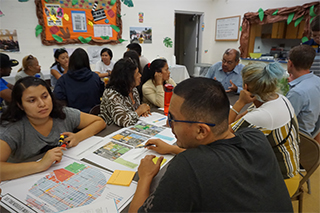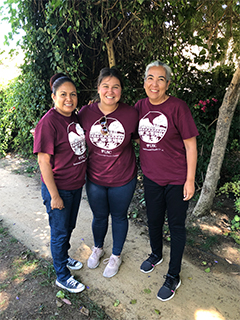Partnerships for Environmental Public Health (PEPH)
Study Location: Los Angeles, California
Academic Partners:
University of Southern California (USC)
Jill E. Johnston, Ph.D.
Occidental College
Bhavna Shamasunder, Ph.D.
University of Colorado Boulder
Michael Hannigan, Ph.D.
Community Partners:
Redeemer Community Partnership
Richard Parks and Brittney Lu
Project Description

Los Angeles (LA) County, California, has the largest urban oilfield in the country, with thousands of active oil wells located near many homes and schools. Although petroleum extraction is common in urban areas, few protections exist to prevent pollutant release into nearby residential areas.
Living near petroleum extraction sites has been linked to various health effects, including adverse pregnancy and birth outcomes, cancer of immune system cells, changes in immune function, and increased risk of emergency visits for asthma. However, epidemiological research documenting such health impacts among LA residents is scarce.
The Los Angeles Voices on Oil, Community, the Environment, and Salud (LAS VOCES) study examines the links between urban oil drilling, air quality, and respiratory health in South LA. This community is located atop the Las Cienegas oil field and is home to low-income, multiethnic people of color who face several environmental health disparities.

Through a community-academic partnership, LAS VOCES assesses the health effects associated with oil drilling wells to inform public health actions in South LA. To facilitate engagement with residents, researchers are collaborating with Redeemer Community Partnership, a local organization that addresses the health and well-being of local families.
Specific project aims are to:
- Advance local research capacity and engage community residents and partners in study design, recruitment, and data collection, and in the development of educational materials.
- Quantify the impact of oil-drilling activities on local air quality using a low-cost community monitoring network.
- Assess the impact of oil drilling on respiratory health over time among a diverse group of study participants living near oil wells in different stages of production.
- Use data collected from interviews with partners from government, nonprofit, academic, and residential sectors to inform public health-protective measures, including a public health action plan for communities located near oil drilling operations.
This study will fill a critical gap in understanding the impacts of urban oil drilling activities and pollutant release on neighborhood air quality and respiratory health. The project will also demonstrate how academic-community collaborations may protect public health in the context of urban oil drilling on nearby vulnerable populations.
Related Links
- LAS VOCES webpage
- For other information, see this infographic on urban oil drilling in Los Angeles, California


